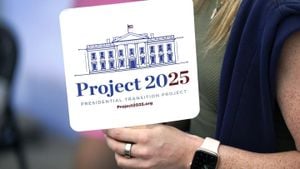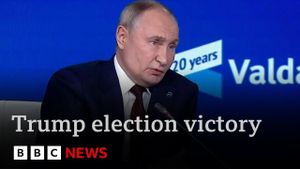Violence erupted on the streets of Amsterdam as Israeli soccer fans were brutally attacked by groups associated with anti-Israel sentiment following their team’s match against AFC Ajax. This incident sparked outrage both locally and internationally, highlighting the growing tensions and divisive narratives surrounding the Israeli-Palestinian conflict.
More than 60 individuals were arrested, and at least five Israelis were hospitalized after they were pursued and assaulted by anti-Israel protesters who allegedly shouted, "Free Palestine!" and other slurs during the clashes. According to reports, the atmosphere quickly escalated from football rivalry to scenes reminiscent of historical threats against Jewish communities, with Dutch officials and Israeli leaders labeling the attack as akin to a “pogrom.”
Among those expressing their anger was Geert Wilders, leader of the far-right Dutch Party for Freedom (PVV), who took to social media to condemn the actions of the attackers, calling them "multicultural scum" and speechifying on the urgency of apprehending those responsible. "Looks like a Jew hunt on the streets of Amsterdam," he declared, underscoring fears surrounding rising antisemitism.
The clashes occurred after Maccabi Tel Aviv supporters congregated around Dam Square, engaging in provocations and chanting offensive slogans against Palestinian groups. Witnesses reported heated exchanges, with mobs attacking not only Israeli fans but also local citizens, including assaults on Arab taxi drivers, which officials attributed to the tensions fueled by the visiting fans.
Prime Minister Benjamin Netanyahu condemned the violence, framing it as orchestrated antisemitism against Israeli citizens and demanding urgent protection measures from Dutch authorities. The alarming actions prompted Israel to expedite evacuation plans for its citizens, dispatching military planes to bring them home safely. Netanyahu spoke with Wilders, promising accountability for the perpetrators.
Dutch authorities, including Amsterdam's Mayor Femke Halsema, characterized this violent outburst as one of the darkest moments for the city. Halsema expressed deep shame over the events and indicated her commitment to addressing the underlying issues surrounding antisemitism and ensuring public safety during future events.
Media descriptions of the event painted alarming visuals, with footage circulating online showing groups of assailants attacking victims with fists and fireworks, leaving many to question how such hostility could materialize within the peaceful precincts of Amsterdam. These images, echoing past tragedies faced by Jewish communities, forced many to confront the discomforting resurgence of hate and violence related to football and political affiliations.
Critics of the state’s handling of these incidents note the historical patterns of violence associated with soccer and the far-reaching impacts of politicizing sports. Some human rights groups have pointed to the participation of Israeli fans engaging in inflammatory chants against Arabs during previous matches, raising questions about culpability and responsibility on all sides. Nicholas McGeehan from FairSquare, for example, criticized the acceptance of the Israeli fans' role and pointed out the complex dynamics of such encounters.
The incident has drawn international attention, stirring debates within the Netherlands and beyond about the nature of protests, the limits of free speech, and the responsibilities of nations to protect all citizens from hate-based violence. Many observers highlighted the challenges faced by post-war European societies grappling with balancing the right to protest against safeguarding community harmony.
Political responses continued to pour in following the violence. While Wilders focused heavily on criticizing the attackers, the broader conversation surrounding accountability also captured attention. Calls for thorough investigations to deter future incidents, along with demands for strategic policies aimed at reducing hate crimes and promoting social cohesion, were increasingly emphasized.
Looking forward, how the Dutch government handles the aftermath of this incident and the discussions it sparks could either exacerbate or mend inter-community relations strained by fear, hatred, and historical enmities.



